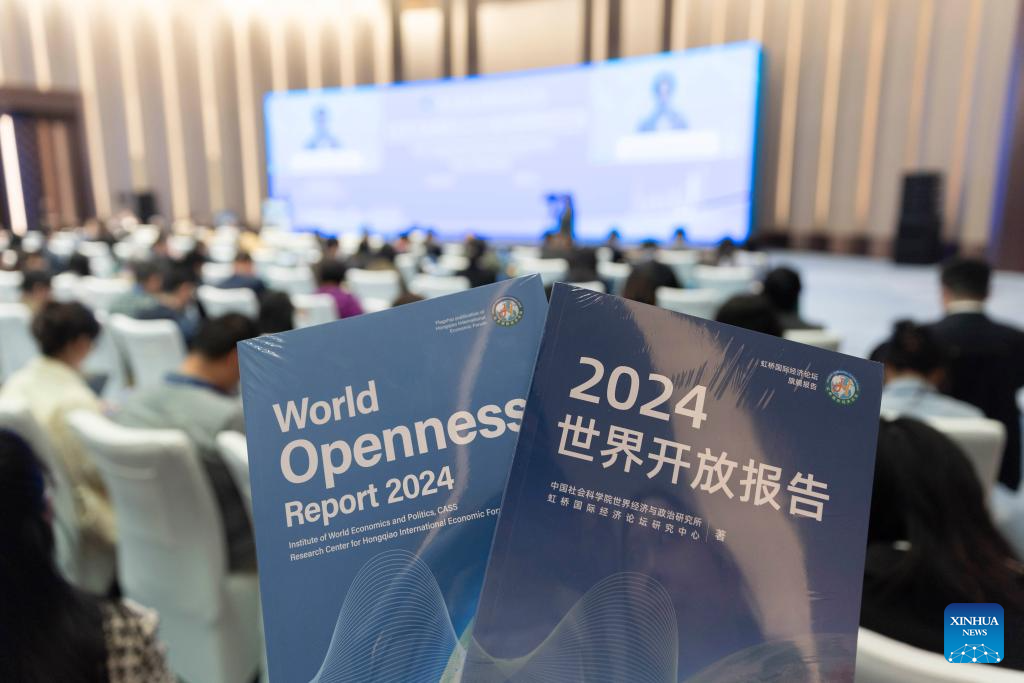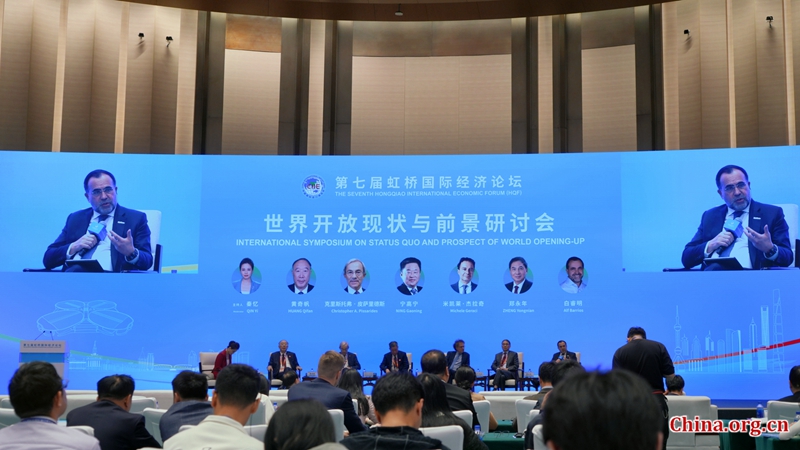
 0 Comment(s)
0 Comment(s) Print
Print E-mail China.org.cn, November 6, 2024
E-mail China.org.cn, November 6, 2024

The World Openness Report 2024 is pictured at the press conference on World Openness Report 2024 and International Symposium on World Opening-Up during the 7th Hongqiao International Economic Forum in Shanghai, east China, Nov. 5, 2024. [Photo/Xinhua]
China has achieved remarkable results in its expansion of openness, according to the 2024 World Openness Report released on Tuesday at the 7th Hongqiao International Economic Forum in Shanghai, held in conjunction with the China International Import Expo (CIIE).
According to the report, China's openness index surged from 0.6789 in 2008 to 0.7596 in 2023 — an increase of 11.9%, and one of the most significant improvements globally. In 2023, China secured the 38th spot among 129 economies, moving up one place from the previous year.
The World Openness Report, the flagship publication of the Hongqiao International Economic Forum, was first launched in 2021 and has now seen its fourth release. The report tracks the openness index of 129 economies since 2008, highlighting global trends and laws of cross-border openness, summarizing best practices, and fostering global consensus for building an inclusive world economy.
The 2024 edition emphasizes building an open world economy, analyzing countries' capabilities for openness and the evolution of their policies. It covers hot topics including the impact of the Global South on global governance, the multilateral trading system, inclusive development of world trade, and global cooperation on digital and green development.
According to this year's report, the global openness index witnessed a 0.12% decline year on year to 0.7542 in 2023, down 0.38% from 2019 and a significant 5.43% drop since 2008. Although the social openness index rose by 1.7%, declines were noted in both economic (0.2%) and cultural (2.4%) indices.
Singapore retained its position as the world's most open economy in 2023, maintaining this status for nearly a decade. Ireland moved up two positions to second place, while China's Hong Kong SAR ranked third, followed by Germany, the Netherlands, the United Kingdom, Switzerland, Malta, Belgium and Luxembourg.
For the first time, the World Openness Report team conducted a comprehensive survey involving nearly 800 experts, including officials from international organizations, business leaders and scholars, to assess perceptions of global openness.
The findings were less than optimistic: only 40.3% of respondents believed that the global economy had become "more open" since 2023, while 59.7% thought it had either remained the same, become "less open" or were uncertain.
The survey identified key factors contributing to the tightening of global openness, such as the expansion of geopolitical conflicts (22.5%), the overstretching of national security concepts (16.8%), anti-globalization trends (16.8%) and the rise of unilateral practices (16.8%).
Conversely, positive developments included advancements in digital technology (29.9%), accelerating green development (19.4%) and the rise of the Global South (19.3%).

Leading academics, economists and corporate executives discuss enhancing opening-up initiatives during the release of the 2024 World Openness Report and the International Symposium on Status Quo and Prospect of World Opening-Up, Nov. 5, 2024, Shanghai. [Photo by Wang Yiming/China.org.cn]
In the report's press release and during the International Symposium on Status Quo and Prospect of World Opening-Up, Cecilia Ugaz Estrada, deputy to the director general and the managing director of the directorate of strategic planning, programming at UNIDO, emphasized that digitalization and the energy transition are the two new driving forces of global economic growth.
"Promoting digitalization hinges on robust government policies that foster an enabling environment for businesses," she said, citing China's "Digital China" and "Made in China 2025" initiatives as examples of successful policy-led practices that have driven significant technological advancements in areas like AI, big data and smart manufacturing.
Qu Weixi, vice president of the Chinese Academy of International Trade and Economic Cooperation, reaffirmed China's commitment to its longstanding policy of opening-up, saying, "China has persistently leveraged openness to foster reform and development, achieving mutual benefits through integration with the world."
With over 1.4 billion people and more than 400 million middle-income earners, China is a "rich mine," Wang Bingnan, China's former vice minister of commence, said. "By fostering market connectivity, industrial integration, innovation promotion and regulatory alignment, we aim to make China's vast market a 'strong magnet' for global trade, investment and innovation activities."
He highlighted the CIIE as an example of this effort. "The CIIE has become a platform for high-level opening up and an international public good shared globally. Over the past six editions, it has achieved intended transaction volumes exceeding $420 billion, with nearly 2,500 new products, technologies and services making their debut," he added.
Go to Forum >>0 Comment(s)